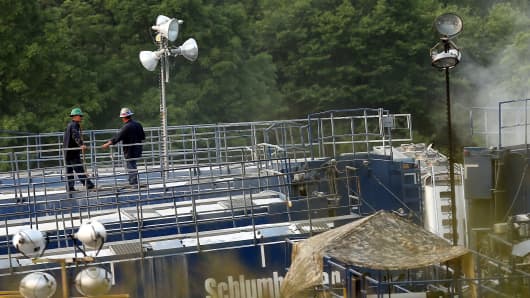Pennsylvania – currently famous for Philadelphia cheese steaks, Hershey's chocolate and ketchup – is in the midst of a transformation that may yet put the state on the map for another American staple: natural gas.
The Marcellus Shale, a 600-mile formation brimming with natgas, is wedging itself into the conversation of the U.S. energy boom, to the Keystone State's benefit.
Last week, energy giant Chevron announced a plan to purchase 61 acres of land around Pittsburgh – one of several Western Pennsylvania communities targeted for Marcellus development – which the company may use as a new regional headquarters. That purchase came on the heels of Chevron's 2011 $3.8 billion purchase of Atlas Energy and its 622,000 acres in the Marcellus Shale.
Although the Marcellus cuts across six adjacent states that include Ohio, Virginia, and New York, it is the Keystone State that's harnessing the formation to reap a windfall in jobs and investment.
In a recent study, Deloitte and Touche said Marcellus "is projected to dominate the Mid-Atlantic natural gas market." The consulting firm added that other regions like the Gulf Coast and the suddenly hot Bakken region in North Dakota "may face stiff competition" as Marcellus is poised to churn out more than 7 billion cubic feet of shale gas per day.
(Read more: Bakken Emerges as Contender for US Oil Drilling Crown)
"We literally have the Saudi Arabia of natural gas under our feet," said Michael Krancer, a lawyer who heads Blank Rome's energy practice and who is also a former Pennsylvania secretary of environmental protection.
The state's production numbers surged by 69 percent in 2012 versus the prior year, and gas exploration jobs that have risen over 80 percent over the same time frame, Krancer said, calling Marcellus' potential "prodigious.The production numbers are off the charts."
Environmental concerns have led to moratoriums on drilling in other Marcellus states, or less aggressive moves to tap the shale bounty.Yet observers say Pennsylvania's lengthy experience with resource development makes it fertile ground for production.
The state "has a history of natural resource development:coal mining in particular," said Susan Christopherson, professor of urban planning at Cornell University and the author of a study examining the unfolding regulatory and legislative framework of Marcellus production. "A place that has experience with this, like Texas, is more likely to support it."
Marcellus is frequently mentioned as a linchpin of a revamped U.S. energy policy, one that provides more jobs and buttresses security. Yet Christopherson cast doubt on how much benefit communities can get from the Marcellus boom.
"Some of these municipalities are going to get tax revenue…but this isn't like manufacturing where you put in a plant and people go to work," she said. "The economic impacts of these kinds of things are uneven, and there's a boom-bust cycle to them."
She added that while many workers associated with Marcellus projects may work in the region, they may channel money to other areas where they either maintain residences, or spend their leisure time.
That includes states like New York and New Jersey, which aren't involved in shale gas production right now. "When you look at jobs development, you don't look at where the activity is. You look at where people are spending money," Christopherson said.
However, that hasn't stopped companies from making major investments, or touting the economic benefits of Marcellus exploration. Two years ago, Royal Dutch Shell plunked down $4.7 billion on a company active in the region, and is building an ethane production hub using Marcellus shale. At the time, Shell's president Marvin Odum said the company's activities would "create more American jobs."
Blank Rome's Krancer said that Marcellus "is at the sunrise of this [energy] renaissance. This is going to be just the beginning of an economic juggernaut for the US and Pennsylvania."



